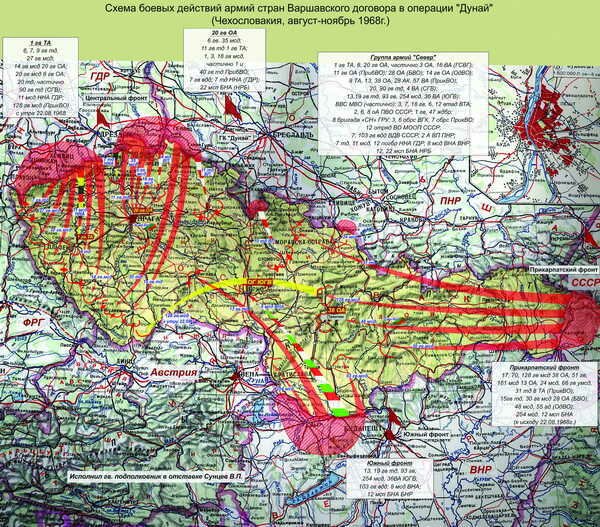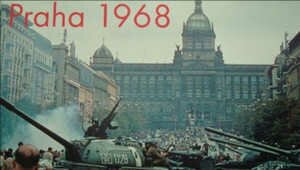
Every year on August 21 Czechs and Slovaks remember the sad events of 1968, when on the instructions from the Kremlin, troops from the Warsaw Pact invaded Czechoslovakia to suppress the processes of democratization. Today, impartial analysis of the events allows to look at the other side of the sources of “hybrid wars”, to understand the current Russian aggressive policy, imperial ambitions, the Kremlin propaganda and behavior of the Russians themselves.
What happened then in a friendly and brotherly to the Soviet Union, Czechoslovakia, and why after those events Czechs and Slovaks for decades for the most part inwardly, but often defiantly, had been treating Soviet citizens as invaders, and this negative attitude has been transferred onto Russian citizens?
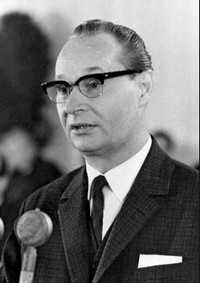 In the mid-1960s there was a movement in Czechoslovakia for economic and social reforms and for observation of freedom of speech. In January 1968, Alexander Dubcek was unanimously elected the First Secretary of the Communist Party of Czechoslovakia and in April, he proposed a radical program of reforms. It provided for democratic elections, greater autonomy of Slovakia, freedom of speech and religion, abolition of censorship of the press, lifting of restrictions on travels abroad, changes in the management and functioning of industry and agriculture. Citizens gladly met such innovations, and this immediately affected the activation of social and cultural life, and these events were called the “Prague Spring”.
In the mid-1960s there was a movement in Czechoslovakia for economic and social reforms and for observation of freedom of speech. In January 1968, Alexander Dubcek was unanimously elected the First Secretary of the Communist Party of Czechoslovakia and in April, he proposed a radical program of reforms. It provided for democratic elections, greater autonomy of Slovakia, freedom of speech and religion, abolition of censorship of the press, lifting of restrictions on travels abroad, changes in the management and functioning of industry and agriculture. Citizens gladly met such innovations, and this immediately affected the activation of social and cultural life, and these events were called the “Prague Spring”.
At the same time, the leaders of the Soviet Union saw in the events in Czechoslovakia threat to the communist regime in Czechoslovakia, and a bad example for other socialist countries. In Moscow, when estimating the effects of various reforms and innovations to build the developed socialism, there dominated imperial thinking. Everything was counted from the position of the balance of forces and confrontation in the world, as well as the consequences for the Soviet hegemony.
Leonid Brezhnev and other Kremlin leaders tried to put pressure on A. Dubcek, during official and unofficial meetings with him trying to persuade him to abandon the planned course, but all in vain. Then in the harsh conspiracy, they began to prepare invasion of troops into Czechoslovakia in order to keep it in the communist camp by force of arms.
First, they activated the work of the residency of the USSR State Security Committee (KGB) in Czechoslovakia. Its office was expanded, contacts with the leaders of the Czech intelligence services (the majority of whom were pro-Soviet) became closer. There were no special problems here. The Soviet KGB men were on the rights of the “big brother”, had access to a wide array of information and mentored what to do and how. They followed every step of the Czechoslovak leaders, bugged and wiretapped their conversations, recruited agents from their circles.
It must have been for the first time since the beginning of the “cold war”, that Soviet intelligence officers — deep-cover agents arrived in Czechoslovakia under the guise of foreign tourists or businessmen. They collected information on moods in the society and tried to establish contacts with anti-socialist elements and even were engaged in spreading leaflets against the new government.
Soviet secret services were involved also in creation of arms caches, which had to be demonstrated later as evidence of the opposition forces' preparations for an armed insurrection. Information received through the KGB's channels and reported to Soviet leaders, was supposed to encourage them to take more decisive actions. Thus, the KGB Chairman Yuri Andropov's subordinates reported on discovered warehouses with weapons allegedly secretly delivered from Germany. In reality, these weapons belonged to the people's militia of Czechoslovakia. There were reports on radio stations provided by the West. At this, the KGB officers themselves were well aware that those radio stations were officially kept in case of a possible war.
Later in the East German press, there was an article about eight American tanks found out near Prague. As it turned out, the Americans were shooting a film about the events of the Second World War. The tanks were ordinary moulages. But the information to the press was given by the Soviet secret services, having not warned even their colleagues from the “friendly German intelligence service” under the leadership of Markus Wolf.
The story of the imaginary American tanks is just one example of the work of what was then the service “A” (active measures) of the First Chief Directorate of the KGB of the USSR. It also forged the “ideological subversion plan in Czechoslovakia”, allegedly developed by the United States. This “plan” was published in the newspaper “Pravda”. Everything was done in order to demonstrate to the world community: events in Czechoslovakia are taking place under the scenario of Western intelligence agencies, and NATO's armies are ready to invade the territory of the country.
In mid-July 1968, the Czechoslovak police received an anonymous call about a new arms cache. In the indicated spot were found five boxes with American guns of the times of World War II. The Soviet press immediately wrote that the United States supplied weapons to counterrevolutionaries. Soon, the Czechoslovak police found out that the weapons were kept in the Group of Soviet Forces in Germany, and apparently got into the territory of the Czechoslovak Socialist Republic as a result of a special operation of the KGB and the East German Ministry for State Security. But no one cared. The flywheel had been ramped up and was already running.
Does all this not remind of today's events around Ukraine? The same (as in the case of today's Russia's attitude to Ukraine): methods of political and diplomatic pressure; forms of destabilizing activities of Russia's special services; approaches and projects of propaganda; deliberate provocations and subversive actions with the same purpose — to prevent the country's democratic development, to keep it in its totalitarian camp! At the same time, the Unified Command of the Warsaw Pact, together with the General Staff of the Armed Forces of the USSR started to develop the operation codenamed “Dunay” (“Danube”). April 8, 1968 Commander of Airborne Forces, Army General V. Margelov got a Directive, according to which he began planning an air assault onto the territory of Czechoslovakia.
The directive stated: “The Soviet Union and other socialist countries, faithful to their internationalist duty and the Warsaw Pact, should bring their troops to assist the Czechoslovak People's Army in defending the homeland from the dangers threatening it”. The document also stressed: “... If the troops of the Czechoslovak People's Army perceive the arrival of Soviet troops with understanding, in this case it is necessary to organize cooperation with them and to carry out tasks together. If the troops of the Czechoslovak People's Army are hostile to the air-born troopers and support conservative forces, then it is necessary to take measures for their localization, and if this is impossible — to disarm”.
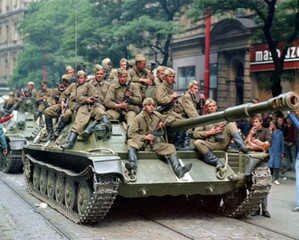 Besides, from May to August 1968 the countries of the Warsaw Pact had held a number of command and staff military trainings to prepare for the invasion, namely: in May and June, — large-scale command and staff trainings “Šumava” with the involvement of units staff, formations and signal corps (under their cover from 20 to 30 June onto the territory of Czechoslovakia for the first time in the history of the Military Bloc of socialist countries, were brought 16 thousand people of personnel; from 23 July to 10 August 1968 in the Soviet Union, the GDR and Poland were held logistic trainings “Neman”, within the framework of which was carried accumulation of reserve troops; August 11, 1968 there began large-scale exercises of Air Defense Forces “Nebesnyi Shchit” (“The Sky Shield”); in Western Ukraine, Poland and the GDR were held trainings of signal troops. In general, under the guise of those trainings, all in all into Czechoslovakia were brought 27 thousand soldiers and officers. And at the end of the trainings there was no hurry to withdraw them. That is, it was a kind of dress rehearsal of a large-scale invasion.
Besides, from May to August 1968 the countries of the Warsaw Pact had held a number of command and staff military trainings to prepare for the invasion, namely: in May and June, — large-scale command and staff trainings “Šumava” with the involvement of units staff, formations and signal corps (under their cover from 20 to 30 June onto the territory of Czechoslovakia for the first time in the history of the Military Bloc of socialist countries, were brought 16 thousand people of personnel; from 23 July to 10 August 1968 in the Soviet Union, the GDR and Poland were held logistic trainings “Neman”, within the framework of which was carried accumulation of reserve troops; August 11, 1968 there began large-scale exercises of Air Defense Forces “Nebesnyi Shchit” (“The Sky Shield”); in Western Ukraine, Poland and the GDR were held trainings of signal troops. In general, under the guise of those trainings, all in all into Czechoslovakia were brought 27 thousand soldiers and officers. And at the end of the trainings there was no hurry to withdraw them. That is, it was a kind of dress rehearsal of a large-scale invasion.
The Soviet side did not exclude the option of entry into the territory of Czechoslovakia of NATO member countries' troops, which at that time had been carrying out maneuvers codenamed “The Black Lion” at the borders of Czechoslovakia.
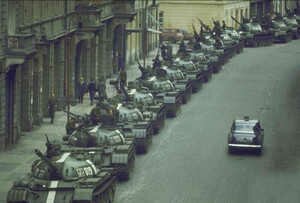 On the night of August 20/21, 1968 approximately 200,000 troops and 5,000 tanks of 5(five) countries of the Warsaw Pact (the Soviet Union, Poland, Hungary, Bulgaria, the German Democratic Republic), except for Romania, entered the territory of Czechoslovakia to suppress the “Prague Spring”. The official reason for bringing troops was the letter of appeal of the “party and government leaders” of Czechoslovakia to the government of the USSR and other countries of the Warsaw Pact “for the provision of international assistance”.
On the night of August 20/21, 1968 approximately 200,000 troops and 5,000 tanks of 5(five) countries of the Warsaw Pact (the Soviet Union, Poland, Hungary, Bulgaria, the German Democratic Republic), except for Romania, entered the territory of Czechoslovakia to suppress the “Prague Spring”. The official reason for bringing troops was the letter of appeal of the “party and government leaders” of Czechoslovakia to the government of the USSR and other countries of the Warsaw Pact “for the provision of international assistance”.
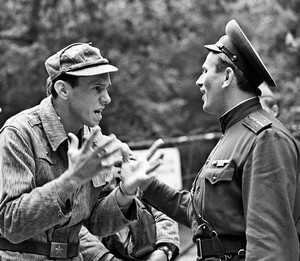 Czechoslovak citizens tried with the help of demonstrations, rallies and other peaceful activities to protest against the intervention, but they were powerless against the Soviet tanks. They tried to remove road signs, to mislead the Soviet soldiers, they threw stones and flowerpots at tanks, and on the walls of houses, they wrote in big letters eloquent phrases: “Father — liberator. Son — occupier”.
Czechoslovak citizens tried with the help of demonstrations, rallies and other peaceful activities to protest against the intervention, but they were powerless against the Soviet tanks. They tried to remove road signs, to mislead the Soviet soldiers, they threw stones and flowerpots at tanks, and on the walls of houses, they wrote in big letters eloquent phrases: “Father — liberator. Son — occupier”.
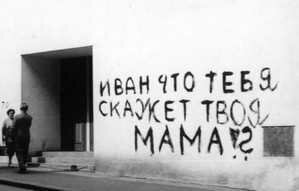 Soldiers and officers of the troops brought in could not understand why the “peaceful action” of the Warsaw Pact caused such a negative reaction of the local people. Because they were not fully aware of their tasks. Zampolits (Deputy Commander for political affairs) kept persuading them that NATO forces were threatening to seize Czechoslovakia and eliminate the people's power and that their own mission was to prevent it and protect the gains of socialism.
Soldiers and officers of the troops brought in could not understand why the “peaceful action” of the Warsaw Pact caused such a negative reaction of the local people. Because they were not fully aware of their tasks. Zampolits (Deputy Commander for political affairs) kept persuading them that NATO forces were threatening to seize Czechoslovakia and eliminate the people's power and that their own mission was to prevent it and protect the gains of socialism.
On the same night, Soviet tanks and armored personnel carriers rolled into Prague and surrounded the building of the Central Committee. Paratroopers rushed into the building, found Alexander Dubcek's office, cut all telephone wires and began to compile lists of those present there. Then A. Dubchek and some active supporters of the reforms under heavy guard were smuggled into the territory of the USSR and temporarily placed in the mountains near Uzhgorod at special dachas (country houses) under the close supervision of the KGB and Militia (Police). Soon, they were sent by plane to Moscow, where, under strong pressure they had to sign all required documents prepared in the Kremlin offices, and resign.
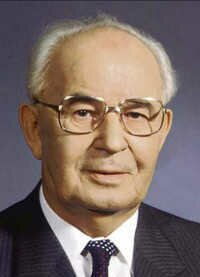 After the implementation of these plans, the intractable Alexander Dubcek was replaced by the appointed by Moscow obedient Gustav Husak. He immediately began mass cleansing, especially among intellectuals and students. Free thinking was actually done with. Half a million people were expelled from the Communist Party and together with their families, in fact, for the two decades were crossed out from the active life of the country.
After the implementation of these plans, the intractable Alexander Dubcek was replaced by the appointed by Moscow obedient Gustav Husak. He immediately began mass cleansing, especially among intellectuals and students. Free thinking was actually done with. Half a million people were expelled from the Communist Party and together with their families, in fact, for the two decades were crossed out from the active life of the country.
Of course, the protests in the country continued, but not in large quantities. In 1969, in Prague, students Jan Palach and Jan Zajíc with an interval of one month committed self-immolation in protest against the Soviet invasion. Having lost faith in the new policy, citizens, mostly highly skilled professionals, emigrated to the West. The atmosphere of disappointment prevailed in the country. Soviet citizens who, after the Second World War were referred to as brothers-liberators, became associated with the occupiers.
In the Soviet Union, people in different ways protested against bringing Soviet troops into Czechoslovakia. Some journalists of major newspapers refused to write what they were dictated by the editors, and were forcibly dismissed from work. But such cases were few. In the Red Square in Moscow August 25, 1968, intellectuals held a small demonstration in support of independence of Czechoslovakia. They unfolded banners with slogans “Long live free and independent Czechoslovakia!”, “Shame on the occupiers”, “Hands off Czechoslovakia!”, “For your freedom and ours!”, “Freedom for Dubcek!” The demonstration was broken up, slogans qualified as defamatory and the demonstrators were sentenced to different terms of imprisonment.
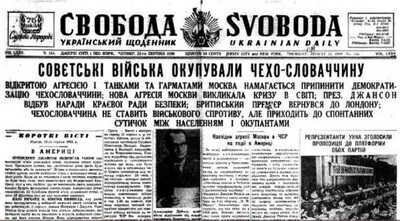 Much more active were protest moods in the Ukrainian society. They peaked at the end of August 1968. The strong pressure of the official Soviet propaganda, tough political censorship could not cover all the channels through which the objective information about the events in Czechoslovakia was coming to Ukrainian citizens. The joint border, family and friendly contacts made it possible to get reliable information.
Much more active were protest moods in the Ukrainian society. They peaked at the end of August 1968. The strong pressure of the official Soviet propaganda, tough political censorship could not cover all the channels through which the objective information about the events in Czechoslovakia was coming to Ukrainian citizens. The joint border, family and friendly contacts made it possible to get reliable information.
From August 21 to September 7, the republican KGB recorded 1182 cases of negative reactions of citizens of Ukraine to the USSR's interfering into internal affairs of Czechoslovakia. There had been reported 23 cases of distribution in the Republic of leaflets and proclamations condemning the Kremlin's policy, aimed against the western neighbor. This is stated in one of the issues of the scientific-documentary publication “From the archives of VUChK-GPU-NKVD-KGB”. It published documents of the KGB of the Ukrainian SSR, showing the reaction of Ukrainian citizens to the events in Czechoslovakia.
These documents pointed out that the protests against the occupation of Czechoslovakia were recorded not only in western regions of Ukraine, but also in Chernihiv, Cherkasy, Kirovohrad, Kharkiv, Donetsk, Odesa regions and so on.
The Report of the republican KGB to the Central Committee of the Communist Party of March 4, 1969 reads about “ideological perversions” in the Writers' Union of Ukraine “biased attitude to some members of the Writers' Union of Ukraine to the events in Czechoslovakia”.
Special departments in the Armed Forces also had more work. Not all soldiers and officers who participated in the events in Czechoslovakia, spoke approvingly of the Soviet party leadership, which had sent them to “restore order” in a foreign country. In letters that came home from military camps in Czechoslovakia, not everything was described as optimistically as reported by Soviet propaganda.
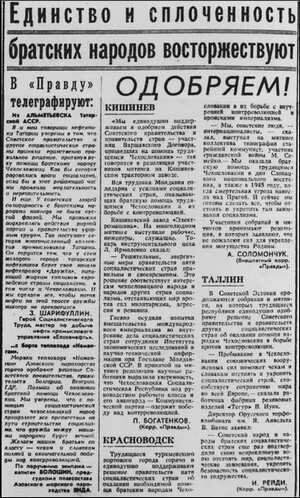 Then all the radio and television channels, news agencies and press in unison were voicing the clearly stated in the Kremlin offices thesis about the “fraternal assistance to the Czechoslovak people in defending the gains of socialism”. As well as the approved thesis about the unanimous support of the peoples of the Soviet Union, including the Ukrainian one, to the foreign policy of the USSR.
Then all the radio and television channels, news agencies and press in unison were voicing the clearly stated in the Kremlin offices thesis about the “fraternal assistance to the Czechoslovak people in defending the gains of socialism”. As well as the approved thesis about the unanimous support of the peoples of the Soviet Union, including the Ukrainian one, to the foreign policy of the USSR.
47 years have passed since then. The world has changed and people have changed their views on the history and the present time have changed. But not everywhere and not everybody. The current Russian leadership looks like those Soviet Kremlin helmsmen, who did not want to see the real state of affairs and did their best to preserve their power and the built totalitarian regime.
History does not teach them anything. No one seems to have learned his or her lessons from those events. And it is worth to remember that the “Prague Spring” was not in vain. It gave significant impetus to further development of the opposition movement, the birth at a new historical stage of ideas of anti-totalitarian mass movements and revolutions that in late 1980s led to the change of the social system in former socialist countries.
In the Russian Federation, they prefer not to mention the events of those days. It is obvious that no one had any desire to somehow compare them with bringing Russian troops into Georgia in August 2008, when the “peace enforcement” operation was carried out, let alone with the recent developments in the Crimea and the East of Ukraine.
At the same time, it is necessary to draw attention to the results of sociological research of the Russian Levada Center, conducted in early 2008 on the 40th anniversary of the Soviet invasion of Czechoslovakia. The results of this poll seven years ago made even before the invasion of Russian tanks into Georgian territory are quite eloquent and allow today to understand the nature of Russia's aggressive and cynical politics, imperial ambitions, the Kremlin's propaganda and behavior of the Russians themselves, their attitude to the events.
Conclusions of the Director of the Levada Center, sociologist Lev Gudkov and his reflections on the results of the study deserve to refer to them today, and even to quote something.
Thus, according to sociologists, in 2008 only 27 % of Russians had some idea of what happened in Prague in the spring and summer of 1968. The Soviet invasion of the CSSR was assessed differently. The official version of the invasion (bringing the troops in response to a request of “healthy forces” in the Czechoslovak leadership) was shared by 20 % of respondents. Slightly more numerous was the percentage of those inclined to think that it was a “campaign of suppression of the people's movement against socialism” and “intimidating potential opponents of the USSR and the communist authorities in other countries of the socialist camp”. But most often there was an answer in which one could trace an attempt to justify the Soviet leadership, was reduced to this formulation: “... it was an attempt in any way to keep Czechoslovakia in the socialist camp”.
26 % of respondents in the motives of the Kremlin leadership to introduce troops saw the desire to preserve the Soviet bloc from imminent collapse if Czechoslovakia came out from under the Soviet Union's influence. The other two possible answers — “fear of a complete collapse of communism, which can be prevented only by force” and “the troops were brought in to prevent the crisis from escalating into a world war” — won 7 % and 6 % respectfully.
In this regard, the Director of Levada Center Lev Gudkov pointed out: “This explanation is very important for understanding the logic of neutralization of the “guilty conscience” of the Russian population. Its essence boils down to the idea that “we”, the Soviet Union (Russia), in any case, will use force, but it is better to do it early to get ahead of Western countries who will come to help the Czech democrats when the Soviet leadership sends troops to suppress them. This “proof from the opposite”, the choice in favour of the “lesser evil” in order to avoid the “greater evil” is a decisive argument for national unity around the government. They begin to forgive the regime all the crimes in the past and permissiveness in the now... “
Lev Gudkov in the conclusions of the research points out that only about 12 % of Russians are supporters of democracy in Russia, that is, “the stratum that understands the value of the democratic system, has historical memory and clearly understands the relationship between the society and the authorities, and has no xenophobia and hostility towards other countries”.
According to the sociologist, the Russians' indifference to the events of 1968 cannot be justified by the fact that Soviet citizens did not understand what really was happening in Czechoslovakia, did not understand the criminal actions of the Soviet leadership. “But solidarity with Czechoslovakia was neutralized by mass dismissal caused by the imperial self-consciousness”.
This is where, according to Lev Gudkov, originates the indifference and alleged forgetfulness that characterize the Russians' attitude to their past. “This is not an accidental symptom of amnesia — he wrote — but a very resistant mechanism of organization of the mass consciousness in the late-totalitarian and post-totalitarian society. Such sentiments can be expressed in one sentence: one should not stir the past, it is better to forget the crimes of the Stalinist period, to leave the torturers and their victims in the oblivion, and to live on. These particular mindsets have become one of the most important components of Putin's authoritarianism”.
These words were written in early 2008!
Drawing conclusions on the results of the sociological research, Lev Gudkov sadly observes “…Erasing memory is facilitated by an urgent desire to demean the importance of the “Prague Spring” not only for the history of the Czechoslovak Socialist Republic, but for the history of the whole Eastern Europe”. He considers such an effect the main achievement of the totalitarian system of information and propaganda, which apart from shameless misinforming, blatant lying and cynical discrediting the events and their participants, devalues the values that guided the participants in the movement for reform. It also destroys in the minds of Russians the idea of the possibility of any change, the belief that there might be a different life, a different social system, and different intergovernmental relations.
Even then, sociologists aptly noticed such tendencies in the Russian society. However, current developments around Ukraine only confirm the conclusions drawn.


